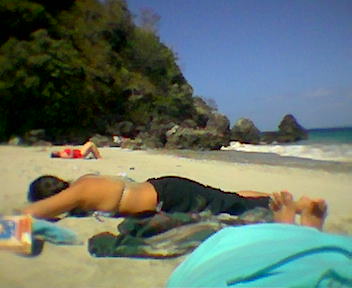Why We Have Been Drinking
It has never bothered me that at times, I go out and drink alone. After all, men are not the only ones who should get an alcohol-induced stress debriefing from work. But this was easier to pull off in
Aside from celebrations, drinking has been associated with depression (the origin of which, I have yet to do some research). Culturally, Filipinos usually indulge in an all-nighters to relieve themselves from a very serious problem; with the intention of not really finding solution to it, but in the context of sharing it among friends and seeking their advice and 'wisdom', e.g. Recent break-up from a relationship, family problems, etc. Ma"bote"ng usapan, kumbaga. Others, those classified to be suffering from alcohol abuse, just drink because they have to and need to. I am far from being classified as one, since there are more sober hours in my life than otherwise. But I admit that my tolerance with alcohol is a bit higher - than average. This is probably due to years of fieldwork during my undergraduate years and work.
In Anthropology fieldwork, drinking is an informal way of data gathering. Stories and information that you find hard to get through normal research methods (key informant interviews, surveys, focus group discussions, etc) becomes easily available for you. When drunk, members of the community become more at ease with you, they talk to you about a lot of things that is reflective of their culture that are usually considered a taboo to talk about or share with an outsider at any other circumstance. You also get to witness certain levels of relations and interactions that are essential to the 'study' that you are doing.
But this does not excuse anthropologists to drink. Don't get the wrong idea. Drinking in fieldwork is optional, of course. You can either remain a sober observer, or not. But the key to this informal method is to be aware of your limits, as does in any other setting.
It was quite challenging the few years when I started doing research as course requirements and drinking. Although I have come from a family with most mortality due to alcoholism, it wasn't until I was about 18 when I tasted my first glass of Zombie (I am not sure, but I think it's a mix of carrot juice/ tomato juice and vodka?). It must be in my genes that I don't easily get zonked, and if I feel that I am getting a bit woozy, I stop or nap - whichever is more convenient. And as you expected, everything else followed.
Work has no difference. My first ever research job was with an American Anthropologist (who has a very close resemblance with George Clooney, by the way); his idea of work is actually fun. So imagine how I felt then, fresh from college, doing work in a community near a white sand beach and with a co-worker/ boss who works only from 10:00 AM to 2:00 PM, four days a week. After work, we would walk from the town center to the place we rent near the beach, about nine kilometers, with Tanduay and Coke in hand. We'd drink until midnight by the beach, talk about work, things we need to get done and eventually he'd start convincing me to pursue studies in the
Other works that followed after that was less fun compared to the first, but equally consisted of drinking - as part of work.
To highlight some, my work with the Aytas in Zambales for years had made me well-adjusted to drinking Ginebra San Miguel, as in the bilog from the bottle with only water from the artesian well to wash the after taste and your own saliva for pulutan which I'd rather consume than palakang bukid. (I don't care if it tastes like chicken, what concerns me is that it doesn't look like one.)
I stayed for more than a year in Baseco, an urban poor area near the port in Manila for a year, doing research and community profile; then, I learned to drink as early as 7:00AM with a group of mothers; one of them was catheterized and was always with her urine collection bag from a kidney failure operation some years back, and every time she drank beer I'd feel a sudden urge to touch the part of my body where my kidneys are. She's still alive, with her own house from Gawad Kalinga and still drinks. It was a session that I so look forward to. I get to hear about these mothers' stories about poverty, living in poverty and relationships, especially stories about wife beating. Also, I have witnessed more killings than I could probably contain. Remember in Pinoy movies when the siga runs amok and slashes everyone who crosses his path? Yes, that type.
An aspect of this work that I think I won't trade for anything else is that work doesn't stop after eight hours. It starts as soon as you get the project and doesn't end at all. After each report, we always go back to the place, as if we've become a part of it. I still attend fiestas in Lupang Pangako, Payatas - the place where the metro dump is; still drink in Mang Kaloy's house that is just a spit away from the infamous dump - his family died from the slide years ago.
As a group of anthropology grad would say, drinking and work blends well.
Labels: Anthropology Fieldwork, Drinking


0 Comments:
Post a Comment
<< Home